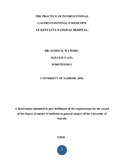The Practice Of Interventional Gastro Intestinal Endoscopy At Kenyatta National Hospital.
Abstract
Background: The gastrointestinal system contributes a large proportion of diseases encountered in daily clinical practice. Interventional endoscopy allows diagnosis and treatment of gastrointestinal diseases with added benefits of minimally invasive therapy. Available interventional GI endoscopy procedures and their outcomes remain unknown in our set up.
Objective: To describe the practice of interventional GI endoscopy at Kenyatta National Hospital.
Study design: This was a prospective descriptive study.
Study setting: The study was carried out at Kenyatta National Hospital endoscopy unit.
Study population: Patients offered interventional GI endoscopic treatment at the endoscopy unit.
Study period: The study duration was six months.
Methodology: Informed consent was obtained from the patient or the guardian and assent obtained from patients below 18yrs. Consecutive sampling was used. Preformed data sheets were used to fill in collected variables. Main outcome measures were interventional procedure offered, sedation modalities and immediate outcome of the procedure. The data was stored in a data base using SPSS® for windows v21.0 (Chicago, Illinois). Analysis was done using frequencies and descriptive statistics.
Results; Interventional endoscopy accounted for 21.7% of endoscopies done. The male; female ratio was 1:0.9. The median age group was 45 years. Variceal band ligation, ERCP and oesophageal stenting were the three most common procedures (respectively 36.9%, 16.1% and 12.8%). Majority of patients (56.4%) received midazolam and pethidine for conscious sedation. Pulse oximetry and pulse rate were used as the sole monitoring variables in 74.9% of patients. ERCP had the highest rate of non-completion at 20.6%. Over sedation and post procedural bleeding were recorded as complications. There were no luminal perforations or mortalities that were recorded during the period of study.
x
Conclusion: Interventional GI endoscopy offers minimally invasive therapy at diagnosis in a variety of gastroenterology diseases with minimal complications. There is still a gap in the variety of interventions available locally compared to other countries.
Publisher
University of Nairobi
Rights
Attribution-NonCommercial-NoDerivs 3.0 United StatesUsage Rights
http://creativecommons.org/licenses/by-nc-nd/3.0/us/Collections
The following license files are associated with this item:


